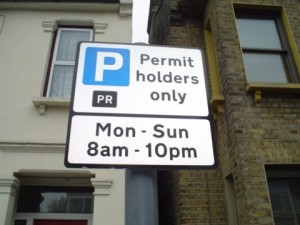Employers in Bristol are calling for the city council to rethink Mayor George Ferguson’s controversial Residents’ Parking Zones (RPZs) to make them more workable for their staff.
Major employers, including those from the health and education sectors, say they share the mayor’s ambition to improve transport and access in Bristol. 
But they fear the introduction of the RPZs in their current guise and at their current pace could hit them hard – with the impact being felt most by staff who are least able to choose alternative means of travel, particularly lower-paid and part-time employees.
A Bristol Chamber of Commerce and Initiative (BCCI) survey of 550 businesses found public service and private sector employers feel the RPZs have been introduced too fast and without the necessary analysis and consultation.
Talks between BCCI and senior council officers have reached deadlock with BCCI saying it has put forward suggestions to ensure the schemes are workable from day one.
Employers are now calling on the council to make changes from immediate effect to allow them to cope better with the changes that RPZs will bring.
These include:
* a more flexible permit system related to the scale, nature and location of organisations based on technical evidence;
* an extension of free parking time;
* phasing-in over a realistic timescale linked to the introduction of alternatives, including orbital bus services, MetroBus and an M32 park and ride
* recognition of the needs of affected organisations within the existing central parking zone;
* a joint working group to monitor the effects and recommend adjustments if necessary.
Nearly three quarters (73%) of firms taking part in the survey felt that consultation with them over RPZs was inadequate and a similar proportion (74%) thought the existing transport infrastructure was not good enough for them to cope with RPZs.
Nearly half (46%) want a more gradual introduction of RPZs so the business community can respond appropriately, while 53% feel there was a need for the council to work closely with the business community and employers to develop a congestion improvement strategy.
Having real alternatives in place for commuters, such as cheaper long-term parking and incentives for car sharing, were seen by the majority of respondents (69%) as key to making initiatives such as RPZs workable in the future.
BCCI director James Durie said: “Employers across the city clearly don’t feel the process of introducing RPZs has taken on board their issues, although there is a strong desire amongst them to play a leading role in addressing the costs created by congestion in the city.
“We support the long-term ambition of the mayor and the council to create a less congested and cleaner city but it is critical that we have in place, and have confidence in, a transport infrastructure that can truly connect Bristol. It needs to be green, fast, efficient, reliable and affordable
“Our biggest concern is that this infrastructure is not yet in place and therefore the impact of introducing the RPZ scheme at the level and pace currently proposed is likely to impact on the organisations and people who are least able to respond, including key workers, SMEs and those in lower paid jobs. Without this, the costs of introducing the scheme could outweigh the traffic benefits.
“We are particularly worried about the ability of major public service organisations to deliver vital front line health and education services in the city.”
Bristol Chamber of Commerce Transport Group chairman Roger Key added: “The findings of the survey demonstrate that there is an opportunity for the Council and the business community to find practical solutions. The fact that only a fifth of those who responded from across the business community were totally against the introduction of RPZs shows that the majority support such initiatives but not in a way that imposes unnecessary costs to their businesses and the city’s economy.”
Low Carbon South West chairman of Alan Bailey said: “As an organisation that represents environmental services and technologies companies that help achieve low carbon economies we are fully in support of schemes that aim to reduce congestion. However it is imperative that the process involves all key stakeholders, of which business is a critical one.”






























